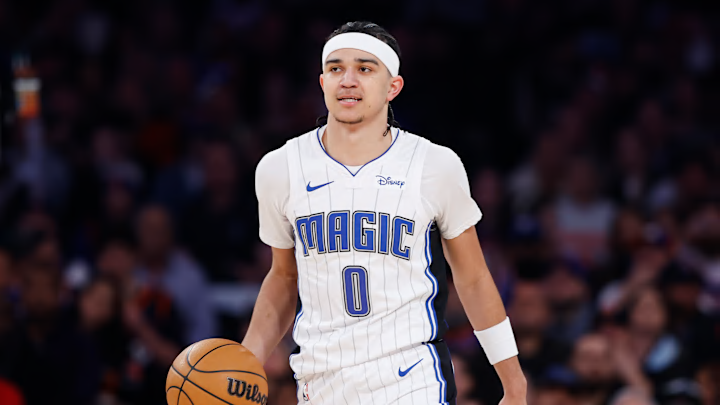Many NBA rookies struggle to see the court when they are drafted by a playoff team. While not many people initially believed the Magic to be a playoff team when they drafted Anthony Black sixth overall, he experienced just that. Wanting to compete, Coach Jamahl Mosley went with more veteran players—Jalen Suggs, Gary Harris, Cole Anthony, and Markelle Fultz—at the guard spots.
Injuries pushed Black into the rotation for a while, but he still only averaged 16.9 minutes per game over the 69 games he played in the regular season. In the playoffs that dropped to 5.5 minutes per game, as he pretty much fell out of the rotation completely. That is not unlikely for a rookie, however. Most coaches would prefer to go with their veteran options over a rookie when it matters the most. While it did not always pay off, it was not a controversial decision by Mosley at all.
In his second season, Black could get a chance to have a bigger impact and secure some more consistent rotational minutes. The Magic are likely going to let Markelle Fultz and Gary Harris walk in free agency, which could open up some room for Black to get playing time.
At only 20 years old, he is already an excellent guard defender, but offensively, he still has plenty of work to do if he wants to be a key piece for the Magic in the future.
Anthony Black must work on this area to be a building block for the Magic
The Magic desperately need more playmaking from their guards. As a rookie, Black did not provide much of that. He only averaged 1.3 assists per game and rarely impressed with his playmaking ability. To his credit, neither did any of the other, more veteran Orlando guards. The Magic's main playmakers and creators were forwards Paolo Banchero and Franz Wagner. Banchero has addressed that issue already, saying that he would like to have a table-setter around.
Fortunately, now Black has a long summer ahead of him, and can work on certain parts of his game. Three-point shooting should definitely be up there. Statistically, Black shot well from long-range, hitting 39.4 percent of his threes during the regular season, but he did so at an incredibly low volume. If he can build up some more confidence and become a more consistent shooting threat, it would go a long way for his development and role with the Magic.
Maybe even more important than that is playmaking, however. If Black can show early next season that he can provide some secondary playmaking, he should be able to secure more minutes. Even when he was one of the starting guards this season, he was rarely asked or expected to make big plays. That might change soon, however. No one expects him to turn into Chris Paul in just his second NBA season, but the Magic need to see if he has the potential to grow into an NBA-level playmaker eventually.
If he can do that, Black could quickly turn into a crucial building block for Orlando. After all, who wouldn't want a 6'7" guard who can defend well, handle the ball, and set up his teammates?
The 2024-25 season could be the first step in that direction, but for a start, Black needs to secure rotational minutes. That is the best way to learn and improve in the NBA. No amount of practice can replace going up against some of the best players in the world and learning from your mistakes on the court.
Right now, the easiest path to getting minutes with the Magic is showing that he can not only provide good defense but also handle the ball and make some solid plays.
